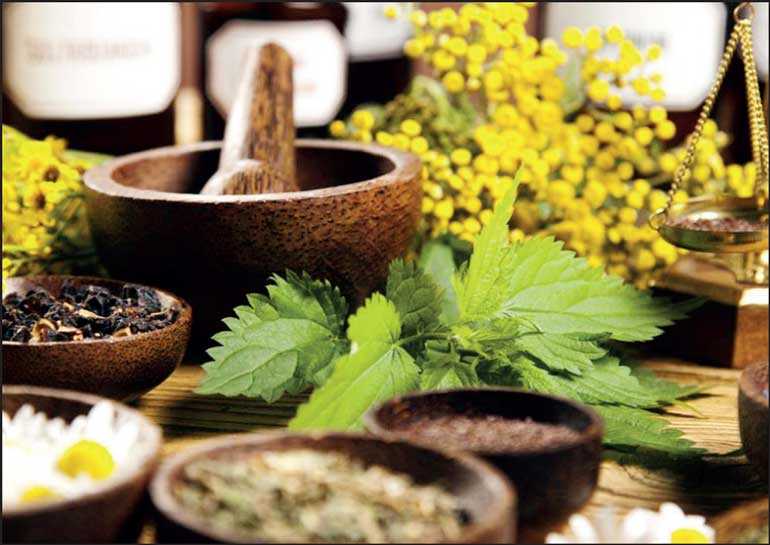Saturday Feb 21, 2026
Saturday Feb 21, 2026
Thursday, 18 June 2020 00:00 - - {{hitsCtrl.values.hits}}

By Dr. Sachini Lakshika Chandrasiri
Sri Lanka’s indigenous medicine history runs 8,000 years back to the period of sage Pulasthi who is the Grandfather of King Rawana. It was Sage Pulasthi who was the only physician who had participated in the conference of sages, which marked the origin of Ayurveda according to Ayurvedaavatharana.
After that, Sri Lankans used to practice special medical systems in which both Ayurveda and indigenous medicine combined together as the basic principles of both medical systems shows synergy. 
COVID-19 is an illness caused due to novel coronavirus, now called as Severe Acute Respiratory Syndrome Corona Virus-2 (SARS CoV-2). It was declared as a pandemic by WHO on 11 March, as it has confirmed its presence in most of the countries over the world with a rapid spread.
Ayurveda mentions about infectious diseases in the chapter named ‘Janapadodvanshaneeya Adhyaya’. They are described as the diseases which destroy large populations at once, affecting their physical features, dietary patterns, psychological attributes etc. Viruses comes under the classification of ‘Krimi roga’ in Ayurveda i.e. Sukshma Krimi.
Apart from Ayurvedic treatments, certain measures are adapted during the present pandemic of COVID-19 is not new to the Sri Lankan indigenous medicine. Practices such as self-quarantine measures were already practiced for infectious diseases in the communities.
This isolation technique practiced in the community were also communicated to the fellow villagers by hanging Neem leaves and mango branches outside the house from ancient times. These leaves demonstrate antiviral activities which is a justifiable reason from the use.
The Sri Lankan way of greeting by clasping the two hands which was recently adopted even in the Western countries is a true measure to avoid contact with germs. It is a natural method for keeping distance from strangers which was a practice to prevent the spread of infectious diseases from olden days rather than embracing and shaking hands.
Sri Lankans used to wash their feet with turmeric water and rub some lime leaves over their heads before entering the house in the past. Both the turmeric and lime have disinfectant properties. Fumigation with Perumkayam, Agil, Gugul, Neem, Thulasi etc. helped to prevent infectious diseases by disinfecting the home environment.
The indigenous food also play a valuable role in the indigenous medical practices. Before tea was introduced by the British, the villagers in Sri Lanka were consuming herbal drinks. These herbal drinks were prepared with natural indigenous ingredients ‘Polpala’, ‘Ranawara’, ‘Neeramulliya’, ‘Coriander’ etc.
The main advantage of these herbal drinks are to boost immunity without any side effects. Every household used to grow these natural herbs. These along with vegetables (without using any artificial pesticides) such as snake gourd, bitter gourd, ridge gourd, baby jack, pumpkin, Drumstick, Kohila, Elabatu, Ambarella are capable in enhancing immunity.
Katu Anoda and Pomegranate are native Sri Lankan fruits which can prevent rapid spread of these type of diseases, again by boosting the immunity.
Rathu heenati, Madathawalu, Batapolel, Pachchaperumal, Suwadel Kuruluthuda are native types of rice, which are used in treatment of indigenous practices.
They have antioxidants, and contains more proteins, Vitamin B, Manganese, Iron and fibre, with a resultant effect on boosting the immunity of the body.
With the growth of the scientific knowledge, we should try to align the indigenous medical practices to face pandemics like COVID-19, as these natural methods will help us to fight against these infection outbreaks with more confidence as a nation which inherits an enriched history.
(The writer holds a Bachelor of Ayurvedic Medicine and Surgery (BAMS) (Hons.) from the University of Colombo and is an Ayurvedic Medical Officer.)